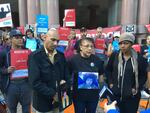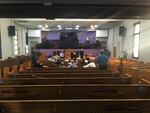
Don't Shoot PDX organizer Teressa Raiford, right, with the parents of Christopher Kalonji outside Portland City Hall on Tuesday. Clackamas County sheriff's deputies shot and killed Kalonji, 19, during a mental health crisis Jan. 28.
Amelia Templeton / OPB
Editor’s Note: Activists with the group Don’t Shoot PDX protested in downtown Portland on Tuesday. While the group advocates for similar interests as the Black Lives Matter movement, Don’t Shoot PDX is a separate group from the Portland chapter of Black Lives Matter.
About 20 people participated in a community meeting Tuesday to discuss police violence and police reform with Portland Mayor Charlie Hales at the First Baptist Church, an historic African-American church in the city's inner northeast.
Meanwhile, across the river, about 50 activists with the Don't Shoot PDX movement gathered to protest the mayor outside City Hall.
The mayor's effort to meet directly with members of Don't Shoot PDX fell apart at the last minute, after some made plans to occupy City Hall again as they had Friday and Hales switched the meeting venue to the church.
Hales eventually came to City Hall, where he spoke with community members outside for close to an hour.
"I moved the meeting because there were social media posts earlier today by people saying they wanted to occupy City Hall. I have no patience with that," Hales told activist Gregory McKelvy, who came to the church to confront him.
McKelvy and a group of 100 or so protesters occupied City Hall for several hours Friday, but agreed to end their occupation after the mayor promised to sit down with them in a community forum this week. Some protesters left disturbing graffiti on the walls in City Hall.
"There are 200 people who work in that building. Quite a few of them complained to me about how frustrating and scary Friday was, and I said, alright, we'll hold the meeting off site," Hales said.
For their part, the Don't Shoot PDX protesters, many of whom were students, said they felt disrespected and objected to the request to meet at a church.

Portland Mayor Charlie Hales held a meeting Tuesday at the First Baptist Church, a historic African American church in inner northeast.
Amelia Templeton / OPB
"Black people are so much bigger than black churches," said McKelvy. "And our movement is so much bigger than religion. It's people."
The group at the church discussed Portland's ongoing effort to reform the police bureau and make policy changes laid out in a settlement agreement with the U.S. Department of Justice.
Portland resident Akos Sarfo-Kantanka described her experience being stopped by police frequently in North Portland, but not in other parts of town and asked Portland Police Chief Mike Marshman to respond to comments made by Republican presidential nominee Donald Trump during Monday night's debate.
"Will you give assurances that no matter who is elected president, the Portland Police Bureau will not be implementing stop-and-frisk?" Sarfo-Kantanka asked.
"No way will we do stop-and-frisk in this town, no matter who is president of the United States," Marshman answered. "That's just bad policing."
Meanwhile, the protesters gathered outside City Hall spoke to the media, but not the mayor, about their grievances including the recent murder of an African-American teenager by white supremacists in Gresham and Hales' effort to negotiate a new four-year contract with the Portland police union.
“It's not a good deal, and it’s the next mayor and the next police commissioner who are going to be living out the terms of the deal,” McKelvy said.
The protesters said mayor-elect Ted Wheeler had reached out to them in the past day to discuss their concerns.
Hales has called the contract a major win for police reformers. It ends the 48-hour rule: a provision that blocked investigators from questioning police for 48 hours after an officer involved shooting. In exchange, the mayor has promised pay increases for officers.
Wheeler has not taken a position on the union contract.
“We’re not going to be the shadow mayor during our transition,” said Michael Cox, Wheeler's spokesman. “Should the current council reach a contract, we will neither block it nor try to pull it across the finish line.”
The Portland City Council will discuss whether to ratify the new police union agreement tomorrow. The contract extension would be in effect until 2020.
